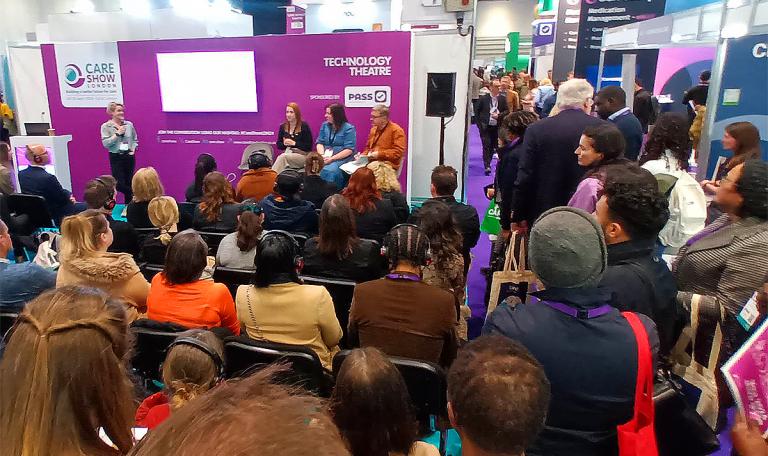Full house at the Care Show

It was standing room only in the Funding for the Future session at the recent Care Show, run by the Digital Care Hub and Digitising Social Care programme (DiSC).
As the number of attendees suggests, there was strong agreement about the benefits of switching to digital social care records. Opening discussions recapped on some of these, including well-known motivations such as saving time and freeing up staff to spend more time with the people they’re caring for. Lesser known benefits were also highlighted like immediate, clear data that can be shared with health professionals and used to spot patterns and signs of deterioration faster, allowing plans to be adjusted and support put in place quickly.
The headline act, of course, was the support on offer – both financial and practical. Kerren Friend, senior programme manager for DiSC, outlined the Adult Social Care Digital Transformation Fund which provides vital funding to support the adoption of digital technologies, and digital social care records in particular. Kerren also talked through how to go about applying and urged people to contact their local Integrated Care System for help and guidance with applications, and reminded delegates that ‘the clock is ticking’ to access funding before the application window closes.
Audience members also shared their thoughts on the switch to digital, with several saying they didn’t realise the extent of funding and support on offer. Many commented that the will and enthusiasm for digital technology was very much there in their organisations, but investing the money and time to select and set up platforms had felt out of reach. Daniel Casson, digital transformation consultant at Care England and former head of business development at Jewish Care, talked the audience through exactly how to go about applying for support and funding, which he added many providers have found is much quicker and simpler than they had feared.
Supporting care staff was another key benefit of digital platforms outlined by session leaders and audience members alike. Kerren Friend, from DiSC, noted that online platforms and digital devices are proving helpful for staff with neurodiversity and for instant, on location access to information and care records for all carers.
Part of the session also highlighted some current pilots and projects using innovative technology to improve care, from sensor-based falls technology to digital platforms which support end of life care for people and their families. Whilst not currently open, these are funded by The Health Foundation’s Tech for Better Care Fund.
Discussions around ‘what’s stopping you?’ or the barriers to adopting digital social care records were open and collaborative with many people sharing direct experience of the challenges of making the switch – from finding the funding to finding the time. There is no getting away from the reality that setting up a new system takes time. But Daniel Casson explained that countless adult social providers have found that the initial time investment pays dividends in a relatively short time, as staff are freed up from paperwork and can update records on location and in real time.
Finally, helpful and practical discussions around the merits of particular suppliers and approaches were also shared, and delegates were reminded that local ICS teams, and the DiSC website, offer lots of information and advice on suppliers, to help social care providers find the right software for the right setting. This includes a list of fully assessed and assured solutions on the DiSC website.